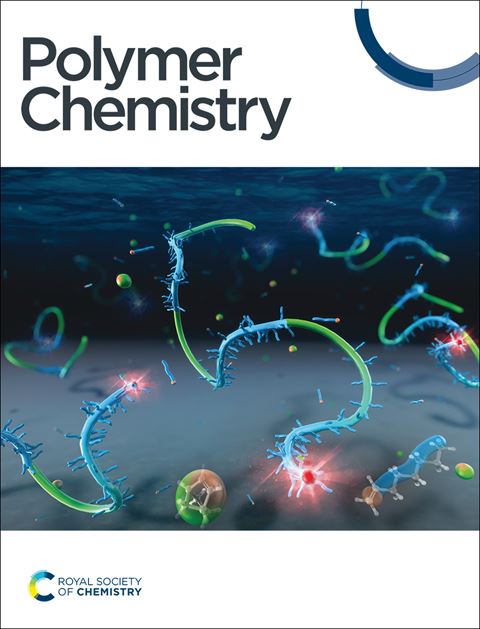Tunable organo-catalysed ring-opening polymerization of ω-dodecalactone macrolactone by the cyclic triphosphazene base†
IF 4.1
2区 化学
Q2 POLYMER SCIENCE
引用次数: 0
Abstract
Degradable aliphatic long-chain polyesters (ALCPEs) with properties comparable to polyolefins are desirable as alternative substitutes for polyethylene. The preparation of ALCPEs by ring-opening polymerization (ROP) of macrolactones has the advantages of atom economy and controllable molecular weight in contrast to the polycondensation strategy. ω-Dodecalactone (DDL) is a derivative of the terpolymerization of 1,3-butadiene and has the potential to be produced on a large scale. Here, we demonstrated that the organobase cyclic triphosphazene base (CTPB) can serve as an efficient catalyst for the ROP of DDL. A high conversion of 95% can be achieved in less than 50 min at 80 °C and 1.0 M monomer concentration. Moreover, the ROP of DDL at 80 °C follows first-order kinetics. Poly(ω-dodecalactone-block-l-lactide) (PDDL-b-PLLA) block copolymers were obtained by the sequential addition of DDL and l-lactide (l-LA) and validated by NMR, DSC, and GPC. The synthesized poly(ω-dodecalactone-random-ε-caprolactone) (PDDL-r-PCL) random copolyester has an adjustable melting point (Tm). The PDDL-b-PCL block copolymer was also successfully obtained by reducing the basicity of CTPB by adding benzoic acid to decrease the activity of CTPB. The present work provides an efficient catalytic system for the facile synthesis of degradable ALCPE materials via the ROP of DDL, which is beneficial for promoting the large-scale production of ALCPEs.
环三磷腈碱可调有机催化开环聚合ω-十二内酯内酯
具有与聚烯烃性能相当的可降解脂肪族长链聚酯(alcpe)是聚乙烯的理想替代品。与缩聚方法相比,采用开环聚合法制备ALCPEs具有原子经济性和分子量可控的优点。ω-十二内酯(DDL)是由1,3 -丁二烯三元聚合而成的衍生物,具有大规模生产的潜力。在此,我们证明了有机碱环三磷腈碱(CTPB)可以作为DDL ROP的有效催化剂。在80°C和1.0 M单体浓度下,在不到50分钟的时间内可实现95%的高转化率。DDL在80℃时的ROP表现为一级动力学,具有可控的ROP行为。通过DDL和l -丙交酯(L-LA)的顺序加成得到聚(ω-十二内酯-嵌段l -丙交酯)(PDDL-b-PLLA)嵌段共聚物,并通过NMR、DSC和GPC进行了验证。合成的聚(ω-十二内酯-随机-ε-己内酯)(PDDL-r-PCL)随机共聚酯熔点(Tm)可调。通过加入苯甲酸降低CTPB的碱度,降低CTPB的活性,成功制备了PDDL-b-PCL嵌段共聚物。本研究为通过DDL的ROP表面合成可降解ALCPEs材料提供了一个高效的催化体系。
本文章由计算机程序翻译,如有差异,请以英文原文为准。
求助全文
约1分钟内获得全文
求助全文
来源期刊

Polymer Chemistry
POLYMER SCIENCE-
CiteScore
8.60
自引率
8.70%
发文量
535
审稿时长
1.7 months
期刊介绍:
Polymer Chemistry welcomes submissions in all areas of polymer science that have a strong focus on macromolecular chemistry. Manuscripts may cover a broad range of fields, yet no direct application focus is required.
 求助内容:
求助内容: 应助结果提醒方式:
应助结果提醒方式:


